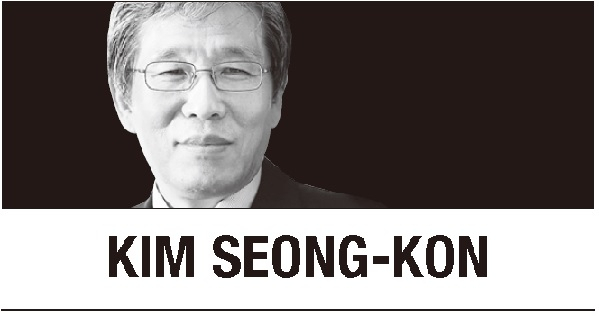[Kim Seong-kon] Living dangerously in this apocalyptic moment
Only if we overcome the “either/or” mentality and embrace a “both/and” construction of mind, perhaps we can postpone the impending Judgment Day
By Korea HeraldPublished : March 1, 2023 - 05:31

Recently, one of my American friends sent me an insightful article by John Semley, “We’re All Living under Gravity’s Rainbow.” Semley writes engagingly about our current historical moment in light of Thomas Pynchon’s groundbreaking novel, "Gravity’s Rainbow": “Looming apocalypse, paranoid conspiracies, rocket-obsessed oligarchs. As Thomas Pynchon’s novel turns 50, it’s world feels unnervingly present.”
Indeed, though published in 1973, Gravity’s Rainbow already brilliantly illustrated the problems of the 21st century. Currently, we are living dangerously because of the lethal pandemic, unprecedented inflation, and other global crises such as the war in Ukraine, the Taiwan conflicts, and North Korea’s incessant missile tests, all of which are threatening our lives and world peace.
What, then, does it mean to be “living under gravity’s rainbow”? A term from physics, “gravity’s rainbow” originally refers to the arc shape of a cannonball’s trajectory, a phenomenon caused by gravity. Since it is a rainbow-shaped parabola, we call it “gravity’s rainbow.” The title of the novel specifically refers to the arc of the V-2 rocket’s flight, which Nazi Germany invented as a vengeance weapon to retaliate against the Allied bombings of Germany.
In "Gravity’s Rainbow," Pynchon warns that the vengeance missile has launched and is now falling on us at terminal velocity. The novel begins with the line, “A screaming comes across the sky.” It means the missile can hit and annihilate us any moment. Therefore, “Living under gravity’s rainbow” means that we are currently living in a deferred moment, just before the final apocalyptic hour.
At the same time, however, Pynchon implies that we may be able to postpone or even avoid the annihilation by letting go of our enmity and vengeance, and embracing diversity and “the other” instead. Pynchon blames both Western imperialism and Third World ultra-nationalism for the cancerous rancor and hatred prevalent in many countries. In addition, he admonishes the misuse of technology to control or destroy humans in totalitarian countries.
A rainbow can also be a symbol for colorful diversity and a coalition of different cultures. It is also God’s covenant that He would never destroy humans. In order to reach the rainbow, we should transcend the gravity that pulls everything down. If the gravity pulls the V-2 rocket down to earth, we will be doomed to perish.
In his earlier novels, "V." and "The Crying of Lot 49," which came out in 1963 and 1966, respectively, Thomas Pynchon also amazingly predicted the socio-political landscape of the 21st century, in which we are now living. We seem to be living in a Pynchon novel when we behold the amazing AI technology called ChatGPT that can interact fluently with humans. In the recent clash between the US and China over spy balloons, we also come to reminisce about Thomas Pynchon’s astonishing novels that prophesied the advent of the era of AI, androids and elaborate conspiracies.
In his first novel "V." Pynchon presents two synthetic humans, Shroud and Shock, who could replace human beings in the future. Here, Pynchon touches upon the perils of a world transformed by science and technology to the point where humankind loses its humanity and ends up turning into a robot-like entity. At the same time, however, Shroud and Shock resemble today’s AI, such as ChatGPT, that can enlighten us.
In his second novel, "The Crying of Lot 49," Pynchon says that we are all living in the state of 49, which refers to the Christian Pentecost. It means that humans are now living in a deferred and suspended final moment, not knowing their destiny. Soon, they may witness either the Holy Spirit’s descent or the coming of doomsday. Therefore, living in the state of 49 is ultimately the same as living under gravity’s rainbow.
In "The Crying of Lot 49," Pynchon depicts our world as a place where paranoia, conspiracies and fake news are rampant. In order to reveal and diagnose our problems, he brings up the motifs of entropy and matrix, which reflect our degenerating, closed society. In the novel, Pynchon also gives us Yoyodyne, a high-tech space industry, which strikingly resembles Elon Musk’s SpaceX.
In "V." the protagonist Herbert Stencil writes in his journal, “Right and Left: the hothouse and the street. The Right can only live and work hermetically, in the hothouses of the past, while outside the Left prosecute their affairs in the streets by manipulated mob violence.” In "The Crying of Lot 49," someone wryly mutters that if you divide the people by “good guys and bad guys, you never get to any of the underlying truth.” The above passages portray the problematic landscape of contemporary Korean society amazingly well.
Pynchon warns that we are now facing the imminent annihilation of human civilization. Only if we overcome the “either/or” mentality and embrace a “both/and” construction of mind, perhaps we can postpone the impending Judgment Day. Otherwise, we all will perish eventually.
Indeed, we are living precariously these days. Pynchon’s novels give us penetrating insights into our society and help us overcome the unprecedented crises we are now facing.
By Kim Seong-kon
Kim Seong-kon is a professor emeritus of English at Seoul National University and a visiting scholar at Dartmouth College. The views expressed here are his own. -- Ed.
-
Articles by Korea Herald








![[Weekender] How DDP emerged as an icon of Seoul](http://res.heraldm.com/phpwas/restmb_idxmake.php?idx=644&simg=/content/image/2024/04/25/20240425050915_0.jpg&u=)
![[KH Explains] No more 'Michael' at Kakao Games](http://res.heraldm.com/phpwas/restmb_idxmake.php?idx=644&simg=/content/image/2024/04/28/20240428050183_0.jpg&u=20240428180321)









![[Herald Interview] Mistakes turn into blessings in street performance, director says](http://res.heraldm.com/phpwas/restmb_idxmake.php?idx=652&simg=/content/image/2024/04/28/20240428050150_0.jpg&u=20240428174656)
